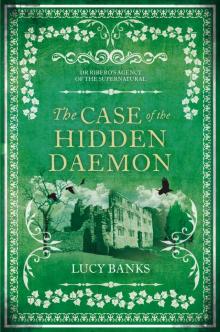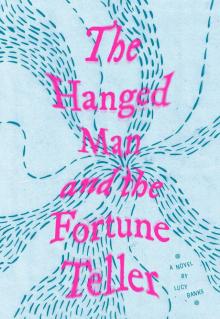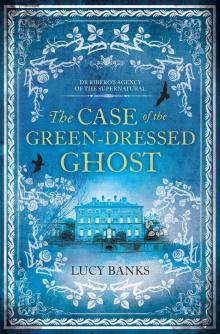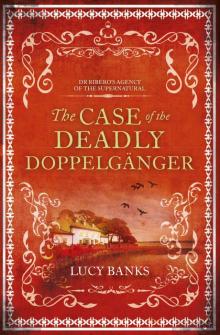- Home
- Lucy Banks
The Hanged Man and the Fortune Teller Page 6
The Hanged Man and the Fortune Teller Read online
Page 6
He returns, eventually. The woman has lit the candles, the strange ones that ooze over her empty wine bottles like erupting lava, a vibrant display of purples, reds, and oranges. She is calmer, glassy-eyed, fingers stroking the sheepskin rug beneath her. The ghost looks to the plastic thing beside her, the transparent, cylindrical thing with a long needle sticking from the top. There’s a stained spoon beside it, blackened underneath by repeated heating, and a metal contraption, from which flame spurts if you strike it correctly. And the welts at her elbow, the marks she usually goes to great lengths to conceal. But not tonight. Tonight, there’s no one around to see them.
The Fortune Teller is already here, watching sorrowfully from her corner. Her eyes gleam with compassion.
“Is it the opium again?”
“They do not call it opium,” she reminds him, easing closer, making sure to keep a wide berth of the woman. “Remember? I told you only a few nights ago. They call it heroin.”
Heroin. It is a grandiose name for something that only causes pain. He tests the word in his mouth, trying to drill it into his memory, to ensure he does not forget it again. Except he knows he will, at some stage. His mind is deteriorating, he knows that, and each day, it seems a little worse.
The woman’s head eases slowly around, as though coasting on a gentle breeze.
She senses us, the ghost realises. Although the woman appears a million miles away, there is an alertness to her, a sensitivity to their presence that the heroin has heightened. For all its ill purpose, it brings her closer to them, and this moves him in a way that he doesn’t quite understand.
“Who are you?” she whispers, eyes saucer-round, then, slowly as a swan gliding on water, she collapses to the floor.
The ghost waits a while, studying her motionless form. “Has her man been back at all?” he asks, flitting to where she is lying. He fears death will find her, if she is unable to find herself in time.
The Fortune Teller shakes her head. “No sign of Frank at all. She was filled with rage when she first came in, then she did this.”
“She went to see Frank and asked him to come home. But he refused.”
“You shouldn’t have gone.”
The ghost feels indignant at this misunderstanding of his good intentions. “Why shouldn’t I? I may have been able to help her.”
“You can’t help her,” she corrects him. “No one can, living or dead. You have to realise that, you’re not here to save anyone. You only wanted to come here to see what she was like, don’t you remember?”
No, I don’t, he answers silently. The realisation stings. What is his purpose again? It is to find his wife, he is sure of it. But he doesn’t know how to locate his Eleanor, he can’t even remember where she died, let alone where she might be drifting now, without him.
He chooses his words carefully. “If you could be of more help with locating my wife, then—”
A single look, and he wilts on the spot, cowed into silence by the force of the Fortune Teller’s glare.
“You know why you can’t find her,” she says, her anger sharpening her, bringing her into focus. “We go through this all the time. You never used to forget so frequently; what is happening to you?”
The ghost frowns. Her rage rattles him, not least because he does have a vague recollection of discussing this before, but cannot remember what was said. He knows it was something to do with a boat, but then, that makes no sense to him. Why should a boat have anything to do with his wife? As far as he’s aware, he wasn’t a seafarer, and neither had she been.
“I think my memory is worsening,” he says eventually, then looks back to Bernadette. Her breathing is deep, melodic as a rising tide. The candles shed wax over the hearth tiles.
The Fortune Teller sighs, then comes closer, reaching for him, passing through him like the wind. “I know,” she says simply, standing beside him. “I shouldn’t lose my temper with you. It must be terrible.”
There it is again, her overwhelming kindness, which he both appreciates and rejects, like a child with a blanket on a warm night. She offers comfort, solace, but also a sense of smothering.
Of drowning, a voice adds, deep within him.
Perhaps, he agrees. Perhaps that too.
They wait, as the seconds tick loudly on the mantelpiece clock. The candles sputter out, one by one, and the room is left in darkness. The woman fails to move; sprawled across the rug, still wearing her heeled shoes, with their elaborate straps.
He does not know what time it is when the Fortune Teller twitches beside him, startled into movement. Her gaze travels to the door, alert as a dog, just as Bernadette’s eyes flicker open.
“He’s here,” the Fortune Teller says warily.
“Who?” the ghost asks, though he already knows the answer.
“Him. Frank.”
Before he can answer, the door flies open, crashing into the wall with animal force. The man is drunk, that much is obvious before he even staggers through the door; and his eyes are pig-small, puffy, and furious, roving around to catch her in his sight.
She doesn’t even flinch as he wrestles her upwards, throwing her against the sofa, clutching her chin between his fingers. The glaze of her expression shows that the heroin still holds her, and the ghost hopes it will numb the pain of what’s to come.
“You stupid bitch, how dare you come to my place of work when I’m doing business!”
A slap, resounding as gunshot. Her head flies to the side, before falling on her shoulder. The ghost cannot see her face, which is a small mercy.
“Do you realise how fucking stupid you made me look?” Another slap, harder than the first. “Do you?”
He hauls her face to his. Rage, torment, dislocated fear, they all congregate, forming the all-too-familiar cloud of darkness. The ghost and the Fortune Teller instinctively melt back against the wall.
The woman murmurs something and holds out an unsteady hand. Her cheek bears the livid mark of his hand.
“What? What did you say?” Frank turns, sees the evidence of her heroin taking; the needle contraption, the heating device, the tortured spoon. He sighs, then slumps to the floor. “Oh, I see. I see. You’re using again, is that it? Jesus Christ, woman; where did you get it from? Did you steal it from me? Because if I have to tell Davey that I’m short on stock, you know what he’ll do to me, don’t you? What he’ll do to us both?”
The woman shakes her head, dazed as a newborn lamb, then starts to sob. To the ghost’s surprise, so too does Frank; a silent, wrenching heaving that causes him to collapse in on himself, like a discarded puppet.
“Oh God, you stupid woman, why do you do it?”
“I don’t know, Frank; I don’t know…”
They crawl together, two beetle-like forms on the rug, and coil around one another, seeking some meagre comfort from the other’s form. The ghost sighs. He has seen this before, it’s always the same. The building rage, the overstepping of the mark, the violence, then finally the bittersweet, despairing reunion. It is what keeps the woman tethered here; those minor moments of tenderness, when Frank erodes, when she can be the strong one instead.
Because then, she feels as though she is needed, the ghost realises. And that is all that matters to her.
“He’ll kill her one day, if she’s not careful,” the Fortune Teller comments. It’s obvious that she’s as relieved as he is at the dissipation of the darkness, even if it’s only temporary.
The words send a shiver of memory through him. I have seen a killing before, he realises. A woman, alone at night. And a man, with a moustache. He knew that man, he’s confident of it. It was someone close to him, someone he once cared about. As for the woman, he’s not so sure, but he recognises her face; that combination of harshness and vulnerability.
A slit throat, he remembers, then as anticipated, the memory fades. It is probably for the best. Some things should not be recollected, and he suspects that is one of them.
The Fortune Teller takes him by the hand, not that he can feel it, but he senses the intention of closeness, and that is warmth enough. “You know we should move on soon, don’t you?”
The ghost smiles. “So you keep saying.” He looks to the woman, still clutching her man, welded to him as tightly as the wax on those empty wine bottles. They’ve melted into one, he realises, then feels a hollowness within him, a deep longing to be held again.
Perhaps she’s right, he thinks, looking at the Fortune Teller, at the steadfast glint of her eyes. Perhaps it is time to move on. Perhaps it’s all this negativity that’s making me forget myself.
“We should find some new people,” he says mildly.
She raises an eyebrow. “We should try simply being alone, and moving forwards.”
SEVEN
— 1877 —
ARTHUR CAME FOR us at midday on the dot, just as he’d said he would. His brougham was a fine sight, though the polished sides and red wheels were looking a little unpolished, much like my brother himself, whose cravat was askew. We laughed to see his head poking above the reins, grinning from ear to ear as he brought the horse to a stop.
“Goodness me, what a day for it, eh?”
“It certainly is, brother,” I replied, smiling as he leapt from the driver’s seat, then gallantly bowed to Eleanor, who giggled like a girl. “This infernal rain, it never seems to stop, does it? It’s hardly shopping weather.”
“Yes, but we must go,” Eleanor said, taking my hand and stepping up into the carriage. “I have so many Christmas gifts to purchase, and if I leave it too late, I’ll have no time to wrap them all.”
Arthur and I exchanged a look.
“You can blame the Queen for this,” he muttered, with a wry grin. “That German husband of hers, bringing all these odd customs into the country.”
“In all fairness,” I corrected him, “people were giving gifts before them.”
“Yes, but not to these excessive levels.” Arthur rolled his eyes, then leapt back up to his seat. “Goodness me, do you remember Christmas when we were children? We thought ourselves fortunate to get some fruit and nuts in a stocking.”
“I remember that year my aunt and I joined you for Christmas,” Eleanor added. “After poor Auntie’s sweetheart left her high and dry, do you remember?”
Arthur chuckled. “I should say so. Your aunt was in a terrible mood, all day long. Mother had to dose her up with plenty of gin to cheer her up.”
“That was the same year that Fred pushed me over in the snow and I cracked my chin on the step,” I said balefully, wincing at the memory of the blood hitting the whiteness below. It had ruined the day for me, as I remembered; my chin throbbing with pain for several hours after.
“Yes, because you called him some awful name or other,” Arthur reminded me. “You could be terribly harsh to him sometimes, you know. Just because our dear Daddy called him those things didn’t mean that you needed to as well.”
“Well, let’s leave that in the past, where it belongs,” I said sensibly. “Now, are we going to go or not? Eleanor is absolutely desperate to spend some money.”
“Gosh, I’m thankful I have no wife to bankrupt me.”
“I heard that,” Eleanor said pertly, leaning over and rapping him on the shoulder. “I’ll have to spend even more now, just to spite you both. Honestly, what a pair of Ebenezer Scrooges you two are!”
We laughed at the reference, and I settled beside my wife as Arthur got the horse moving again. It was a brisk, gloomy day, the threat of more rain looming in the distance, yet my spirits were high. After all, Christmas was approaching, and best of all, Eleanor suspected she may be with child, though it was too early to be certain. I longed to confide in Arthur, to see the smile on his face, but I’d given my word that I’d keep it a secret until Eleanor was certain. It thrilled me, the thought of a child, our child, nestling deep within her, growing even as we sat here, readying itself for the world. What sort of parents would we be? Would I be more like Mother, kindly and fussy, or severe and firm, like Father had been? Fred had always teased me that I was unbearably like our father in temperament, which was ironic, given how much he had taken after him in appearance. We’d almost certainly need a nanny to help Eleanor in the house, though I scarcely knew how I was going to afford it. I’d have to find a way, if necessary.
Eleanor caught my eye and smiled, resting a hand on her abdomen. It never ceased to delight me how we could read one another’s thoughts. She referred to it as ‘psychic energy’, no doubt an expression she’d learned as a younger woman, when we used to visit the circuses when they came to town. She and Arthur had always had a fondness for the unusual, which was surprising, given how even-tempered and moderate they both were. I usually only accompanied them as a means of getting closer to Eleanor, though as we had grown older, Fred had put a stop to that, with his barbed comments and surly stares.
Still, I liked to humour her in her little oddities. They were part of what made her so wonderful.
“So,” Arthur shouted over his shoulder, collar turned up against the wind. “Where are we headed to first, eh?”
Eleanor edged forward. “I should very much like to go to Fortnum and Mason, if that’s all right? They’ve got the best selection. And perhaps Whiteley, and Harrods too?”
“I see.” Arthur cast a quick glance at me, chuckling. “I’ll be carting you two all over the city, is that right? I should charge by the hour, I’d make a fortune.”
Eleanor slapped him on the shoulder. “It’s mainly Fortnum’s that I need to visit. I presume you’ll be dandifying yourself up in Liberty?”
“They do have the best selection of fabrics.”
I laughed, then settled back against the seat. Arthur was certainly becoming the well-to-do gentleman these days, but then, why not? He worked hard at the bank, and had been promoted twice in quick succession. He deserved all of this, even if his rapid ascent was something of a shock. But then, that was how he’d always been. Good old Arthur. Hard-working, ambitious, yet eternally good-natured. How could I begrudge him his success, when he’d striven so hard for it, in such an amicable manner? Though deep down, I wished some of his fortune would rub off on me. No matter how many times I pressed for promotion, I always seemed to be overlooked. One day, I’m sure, I told myself, glancing again at Eleanor’s stomach. I just need to be patient.
“How’s Fred?” I asked, more out of courtesy than anything else. The last time I’d seen him hadn’t ended well, mainly thanks to his unpleasant strumpet, Elizabeth Stride, who’d entirely ruined poor Mother’s luncheon party. By the end of the afternoon, we’d all been more than delighted to see her leave. Her presence had been much like a cloud, ruining the good mood of the party; and Fred’s behaviour hadn’t been much better.
Arthur tutted, then rapped the horse’s rump with his whip, sending the brougham into a sudden spurt of motion. “Fred’s morose, as always,” he replied. “The wedding’s off, by the way. Did Mother tell you?”
“No.” I looked at Eleanor. We were always the last to know these things. “What happened?”
“Not quite sure, though I suspect Fred uncovered some rather distasteful things about Elizabeth’s past, by the sound of it.”
“Heavens, what sort of things?” Eleanor leaned over the seat, oblivious to the biting breeze.
Arthur shifted in his seat. “Oh, I don’t know. Mother only said that Fred had heard some rumours from friends, about his Long Liz and her previous employment.”
“Gosh.” I scratched my chin. The news didn’t surprise me. If anyone ever looked like a woman of ill repute, it had been her. Long Liz, I thought with a smirk. What a strange nickname. I wonder how she’d earned it?
“Mother was rather horrified.”
“I can imagine.” Mother was remarkably liberal, but the thought of welcoming such a creature into her house was probably a step too far. It mortified me too, the memory of us sitting in the garden,
casually talking to a woman of that nature. What had Fred been thinking? Especially with Martha present, not to mention my wife. They were impressionable; they should not have been exposed to such a woman.
We rattled towards the heart of the city, through the busy streets, past crowds of people, all wrapped up warm against the chill air. London never ceased to fascinate, carriage after carriage bouncing merrily down the main thoroughfare, shop awnings quivering in the wind. It was the sheer variety of people that astounded me; elegant gentlemen passing beggars on street corners, all shades of society blended in a single, simmering pot.
Still, I was glad we didn’t live too close to the centre. Our little house, close to the Thames, was ideal, apart from the bells of St Magnus the Martyr chiming at all hours, which did get rather wearing on occasion. In our cosy home, Eleanor and I felt a part of the excitement of the city, without being submerged in it. Living in the very centre must feel a little like drowning, I suspected; too much noise, stimulation, and the suffocating press of so many other people.
Finally, Arthur pulled to a stop, leaping nimbly to the floor, then opening the door for us both.
“How’s that for service?” he declared, offering his hand for Eleanor to climb down.
“You’re very kind, good sir,” she replied, smoothing her skirt. “And thank you ever so much for bringing us in, it’s certainly the way to travel.”
“Ah, that’s nothing. Have you tried that underground railway yet?”
I shuddered, clambering down to the street, then closing the brougham door. “Absolutely not. I’ve heard the tunnels are choked with smoke and gas.”
Arthur laughed, before patting me on the back. “You’re so very cautious, brother! You should give it a go, it’s exhilarating. Whistling through the darkness, arriving at your destination in a matter of minutes. It really is an experience.”

 The Case of the Hidden Daemon
The Case of the Hidden Daemon The Hanged Man and the Fortune Teller
The Hanged Man and the Fortune Teller The Case of the Green-Dressed Ghost
The Case of the Green-Dressed Ghost The Case of the Deadly Doppelgänger
The Case of the Deadly Doppelgänger